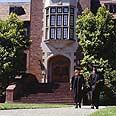
Strong Jewish experience on campus (illustration)
צילום: Index Open
Lutheran school hot among Jews
About 34% of students in Muhlenberg College in Pennsylvania - erected around soaring stone chapel with cross on top - are Jewish, ranging from secular to Orthodox. 'Jews are like nothing else in terms of word of mouth,' explains Hillel House director
One of the hottest college campuses in the US for Jewish students is also one of the unlikeliest: A small Lutheran school erected around a soaring stone chapel with a cross on top.
In what is being called a testament to word of mouth in the Jewish community, approximately 34% of Muhlenberg College's 2,200 students are Jewish. And the biggest gains have come in the past five years or so.
Perhaps equally noteworthy is how Muhlenberg has responded: Offering a kosher menu at the student union, creating a partnership with the Jewish Theological Seminary in New York, and expanding its Hillel House, a social hub for Jews.
"What makes us stand out is that we actually enjoy our diversity," said Randy Helm, the college's president, an Episcopalian. "Our close-knit community has embraced differences rather than pulling into its shell or fracturing along religious, ethnic or other lines."
Many major universities — including some of the country's most highly selective schools — have large proportions of Jewish students, far bigger than the 2% of the US population that is Jewish. But how, one might ask, did this come to pass at Muhlenberg, a liberal arts school little known outside Pennsylvania?
Muhlenberg graduate Ben David, now a rabbi on New York's Long Island, said it is a question worthy of Malcolm Gladwell's best-selling book "The Tipping Point," which analyzes how trends develop.
"Jews are like nothing else in terms of word of mouth," said Patti Mittleman, director of Muhlenberg's Hillel House. "There are so many Jews at Muhlenberg who are having a positive experience at Muhlenberg. That gets talked about in the synagogue and in youth group and in summer camp and in all of those ways that Jews meet each other and talk to each other."
Muhlenberg's Jewish students range from the secular to the Orthodox, and most come from the Northeast Corridor. Allentown is an hour from both Philadelphia and New York.
Founded as a seminary in 1848, Muhlenberg (pronounced MYOOL-in-burg) was renamed nearly 20 years later for Henry Melchior Muhlenberg, a founder of the US Lutheran church. The college is affiliated with the Evangelical Lutheran Church in America, though it says it receives only minimal financial support from the denomination. The campus chapel is used to this day for both worship and annual student convocations. But there are no required religion classes, and there is no mandatory church attendance.
'Even rabbi willing to send his son here'
Muhlenberg's Lutheran roots are not relevant in an era when universities' religious ties are generally looser than they once were, said Jeff Rubin, a spokesman for the national Hillel organization for Jewish students. He noted strong campus Hillels at Roman Catholic schools like Boston College and Georgetown. And Emory University in Atlanta, which was founded by the Methodist Episcopal Church, is about 30% Jewish.
"Any university that goes out of its way to create a Jewish community on its campus is going to enjoy an influx of Jewish students," Rubin said.
While many Lutheran colleges have diverse campuses, Muhlenberg is unique in the size of its Jewish enrollment, said Bill Hamm, president of the Lutheran Educational Conference of North America, which represents 40 such institutions in the US and Canada.
Hamm was at a loss for an explanation. But he said that perhaps the lesson to be learned from Muhlenberg is how "to be a welcoming community for others."
David, the rabbi, said Muhlenberg's welcoming attitude led him to attend the school in the mid-1990s. He half-joked that his choice may have unwittingly given the college the "official stamp of Judaic approval" in the region since his father is also a rabbi in the large Philadelphia suburb of Cherry Hill, N.J.
"If a rabbi is willing to send his son to this place, then the Jewish experience there must be pretty strong," said David, 34.
Still, many people give one main reason for Muhlenberg's popularity: The sociable Mittleman, who has been at the college for 22 years. In "Tipping Point" terminology, she is the "connector," linking people of all faiths and backgrounds.
A new dining hall at the $47,000-a-year college opened last fall with two kosher food stations, allowing observant Jews to eat with their friends in a common food court instead of in a separate cafeteria. In January, Muhlenberg announced a semester study program at the Jewish Theological Seminary. The school is also considering a major in Jewish studies, currently offered as a minor.
And last month, hundreds attended the opening of an expanded Hillel that now can seat more than 300 for Shabbat dinners and bagel brunches, which students say are popular with Jews and non-Jews alike.
Samantha Blum, a 22-year-old senior, grew up in a Conservative Jewish home in Villanova, Pa., hearing only Hebrew at her synagogue's services. Now she enjoys the English services at Hillel, which also include music.
"I think college is the perfect place where you can experience those differences," she said.
Joel Reitz, a Muhlenberg student government leader and member of the Lutheran Student Association, described Hillel as "a great social environment" for students of any religion.
"It's so integrated into the fabric of the college," said Reitz, a senior from Madison, Conn. "It's just a fun place to be on any day of the week."
- Follow Ynetnews on Facebook










